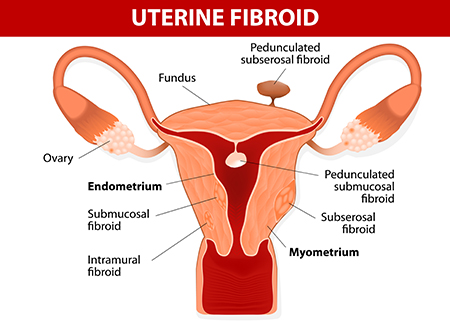Uterine Fibroid Removal

Women with fibroids often report heavy menstrual bleeding that can last anywhere from several days to several weeks. They also often experience low levels of energy due to anemia. Many women say that the heavy bleeding causes them to miss several days of work each month because their energy is so low or they cannot deal with the embarrassment of bleeding through their clothes. Your Raleigh OBGYN is prepared to support you with the information you need to treat your fibroids and get you back to feeling like yourself again.
What are fibroids?
Fibroids are the most common form of tumors of the female reproductive system. You may hear fibroids being referred to as uterine myomas, leiomyomas, and fibromas. Fibroids are hard masses of muscle and connective tissue that form in the uterus. Researchers estimate that between 20% to 50% of women currently in their reproductive years have fibroids. Fibroid tumors are non-cancerous 99% of the time. Although fibroids are not associated with cancer, they can grow to a rather large size and can cause several health problems that may require surgery.
What causes fibroids to grow?
No doctor can say for sure why fibroids grow or why they are so prevalent amongst women today. Some researchers believe that fibroids are a result of a strange muscle cell in the uterus that feeds off excess estrogen in the body. Fibroids can be as small as an almond. Large fibroids can grow to be as large as a grapefruit. Fibroid tumors tend to grow in clusters in different sizes in and around the uterus.
What are common symptoms for women with fibroid tumors?
It is possible that some women with fibroids develop no symptoms and may never know they even have them. However there are many others who find that uterine fibroids can interrupt their quality of life. The experience of living with fibroids is different for each woman so there is no typical set of symptoms. However here are a few of some of the most common symptoms in women with uterine fibroids:
-
Heavy periods that can last from several days to several weeks
-
Spotting between periods
-
Pain in the pelvis caused by fibroids pressing up against other organs
-
Frequent urination caused by fibroids pressing up against the bladder
-
Lower back pain
-
Painful sexual intercourse
How are fibroids diagnosed?
Your gynecologist can detect small and large fibroids via a routine pelvic exam. You may also be able to feel fibroids by doing an abdominal examination where you will find a large, firm mass in the uterus. Your doctor may also request an ultrasound, an MRI, or x-rays of your uterus if your fibroids are causing you problems that may require surgery.
What are common treatments for fibroids?
When you are initially diagnosed with fibroids, your gynecologist may want to do a wait and see approach. Fibroids often stop growing or disappear on their own, particularly as women approach menopause. However larger fibroids that are causing heavy bleeding, severe anemia, or pain may require a more aggressive approach.
-
A hysterectomy is the surgical removal of the uterus. Fibroids are the most prevalent reason women choose to get a hysterectomy today.
-
A laparoscopic myomectomy is the surgical removal of the fibroids while keeping the uterus intact.
-
GnRH agonists, or Lupron, is a hormone that can lower the concentration of estrogen in the body causing the body to go into menopause. This can help to shrink the fibroid, making surgery a bit easier to do.
-
Uterine artery embolization, or UAE, is a minimally invasive surgery where the blood supply to the fibroids are blocked off until they shrink.
-
Contraceptive pills are often given as a way to reduce heavy bleeding during their menstrual cycle. Birth control pills do not make fibroids grow larger, nor do they make them shrink.
Do you think you may have fibroids and want to be sure? Give your favorite experts in women’s health care in Raleigh, NC a call for an appointment today.
